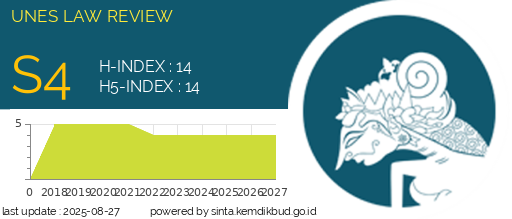COMPLIANCE OF POLRI MEMBERS WITH THE ENFORCEMENT OF THE STATE POLICE PROFESSIONAL CODE OF ETHICS OF THE REPUBLIC OF INDONESIA
DOI:
https://doi.org/10.31933/unesrev.v5i3.393Keywords:
Compliance, Code of Ethics, Indonesian National PoliceAbstract
The Indonesian National Police has the capacity to maintain peace in society. Police agencies have an obligation to act as a driving force for the creation of security and order in people's lives. The existence of police agencies is required to be able to overcome various problems that exist in society, especially the problem of compliance with police officers in enforcing the police professional code of ethics towards optimizing police member compliance. This research method is normative research by using statutory and conceptual approaches as a basis for answering these problems. The conclusion is that the enforcement of the police professional code of ethics is due to the weak internal control carried out by the police agency on all of its members. This weak internal oversight has caused many cases of violations of the police professional code of ethics to emerge. The efforts of the Indonesian National Police in improving its internal affairs must be able to uphold the law without violating the professional code of ethics. So that the formation of disciplinary regulations for POLRI members aims to increase and maintain credibility and unwavering commitment. The credibility and commitment of members of the National Police are as state officials who are given the task and authority as protectors, protectors and public servants, as well as law enforcers and maintaining security.
Downloads
References
Anggi Setiawan dkk. 2020. “Budaya Kerja Kepolisian Dalam Pelayanan Masyarakat di Polsek Rappocini Makassar”, Jurnal Unismuh, 1(2).
Basyarudin, Budi Kurniawan, 2021, “Penegakan Kode Etik Polri Terhadap Anggota Porli Yang Melakukan Tindak Pidana”. Rechtsregel Jurnal Ilmu Hukum. 4(1),
Darmansyah dan M. Iqbal. 2019. “Implementasi Kode Etik Profesi Terhadap Anggota POLRI Yang Melakukan Tindak Pidana Pencurian (Studi Penelitian di Wilayah Hukum Polda Aceh)”, Jurnal Ilmiah Mahasiswa Bidang Hukum Pidana, 3(2),
Desty Puteri Hardyati, dkk, 2022. “Implementasi Kode Etik Kepolisian Pada Kasus Novia Widyasari”, Jurnal Lontar Merah. 5(1),
Eivandro Wattimury dan Erwin Ubwarin, 2021. “Analisa Yuridis Pertimbangan Komisi Kode Etik Profesi Polri Terhadap Anggota Yang Telah di Vonis Bersalah Melakukan Tindak Pidana (Studi Pada Komisi Kode Etik Profesi Polri Polda Maluku)”, Jurnal Belo, 7 (2),
Elvi Alfian. 2020. “Tugas Dan Fungsi Kepolisian Untuk Meningkatkan Kepercayaan Publik Terhadap Penegak Hukum”, Legalitas: Jurnal Hukum, 12(1),
Muhammad Guntur, 2017. “Fungsi Kepolisian Negara Dalam Pemeliharaan Keamanan dan Ketertiban Pada Masyarakat Kota Sengkang Kabupaten Wajo”, Jurnal Al Hikam. 1 (3),
Ni Ketut Sari Adnyani, 2021. “Kewenangan Diskresi Kepolisian Republik Indonesia dalam Penegakan Hukum Pidana”. Jurnal Ilmiah Ilmu Sosial, 7(2)
Pudi Rahardi. 2007. Hukum Kepolisian (Profesionalisme dan Reformasi POLRI), Cet. I, Surabaya: Laskbang Mediatama,
Rama Ridial Allif Ramadan. 2022. “Implementasi Keprofesionalitas Polri Dalam Melaksanakan Tugas Berdasarkan Peraturan Kode Etik Profesi Polri”, Jurnal Solusi. 20(3),
Serlika Aprita, 2020. Etika Profesi Hukum, Bandung: PT Refika Aditama,
Sadjijono, 2010, Memahami Hukum Kepolisian, Yogyakarta: Laksbang Pressindo Offset,
Ronny R. Nitibaskara, 2006, Polisi dan Korupsi, Jakarta: Pustaka kartini
Yanius Rajalahu. 2013. “Penyelesaian Pelanggaran Kode Etik Profesi Oleh Kepolisian Republik Indonesia”, Jurnal Lex Crimen, II(2),
Downloads
Published
How to Cite
Issue
Section
License
Hak cipta :
Penulis yang mempublikasikan manuskripnya di jurnal ini menyetujui ketentuan berikut:
- Hak cipta pada setiap artikel adalah milik penulis.
- Penulis mengakui bahwa UNES Law Review berhak menjadi yang pertama menerbitkan dengan lisensi Creative Commons Attribution 4.0 International (Attribution 4.0 International CC BY 4.0) .
- Penulis dapat mengirimkan artikel secara terpisah, mengatur distribusi non-eksklusif manuskrip yang telah diterbitkan dalam jurnal ini ke versi lain (misalnya, dikirim ke repositori institusi penulis, publikasi ke dalam buku, dll.), dengan mengakui bahwa manuskrip telah diterbitkan pertama kali di Jurnal UNES Law Review.



















